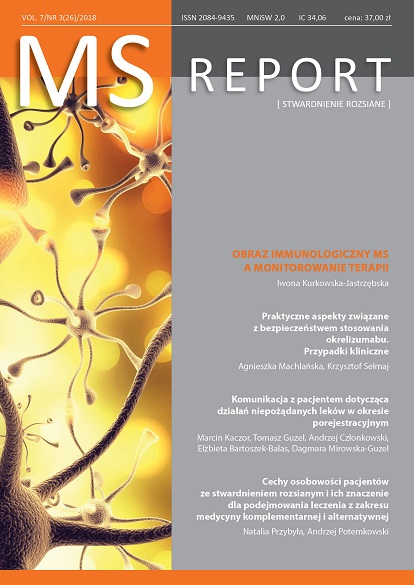Practical aspects of ocrelizumab treatment. Clinical cases Case report
Main Article Content
Abstract
Ocrelizumab is a humanized monoclonal antibody directed against CD20 antigen. This molecule is expressed only on the surface of B lymphocytes, it is present neither on precursor cells nor on plasma cells. Infusion of ocrelizumab evokes rapid B-cell depletion. It is caused mainly due to complement activation and antibody-dependent cellular cytotoxicity (ADCC). In patients with relapsing multiple sclerosis (RR MS) in OPERA I and II trials, ocrelizumab was associated with lower rates of disease activity and disability progression than interferon β-1a over a period of 96 weeks. In patients with primary progressive multiple sclerosis (PP MS) in ORATORIO trial, ocrelizumab was associated with lower rates of clinical and MRI progression than placebo. The results of these trials led to ocrelizumab registration in January 2018. In both trials participated a few polish sites, including Centrum Neurologii in Łódź. In this article we will address practical issues of ocrelizumab treatment such as: indication for treatment, drug administration, benefits for patients, side effects and others.
Article Details
Copyright © by Medical Education. All rights reserved.
References
2. Hauser S.L., Bar-Or A., Comi G.N. et al.: Ocrelizumab versus Interferon Beta-1a in Relapsing Multiple Sclerosis. Engl. J. Med. 2017; 376(3): 221-234.
3. Montalban X., Hauser S.L., Kappos L. et al.: Ocrelizumab versus Placebo in Primary Progressive Multiple Sclerosis. N. Engl. J. Med. 2017; 376(3): 209-220.
4. Wolinsky J.S., Montalban X., Hauser S.L. et al.: Evaluation of no evidence of progression or active disease (NEPAD) in patients with primary progressive multiple sclerosis in the ORATORIO trial. Ann. Neurol. 2018 Aug 29 [Epub ahead of print].

